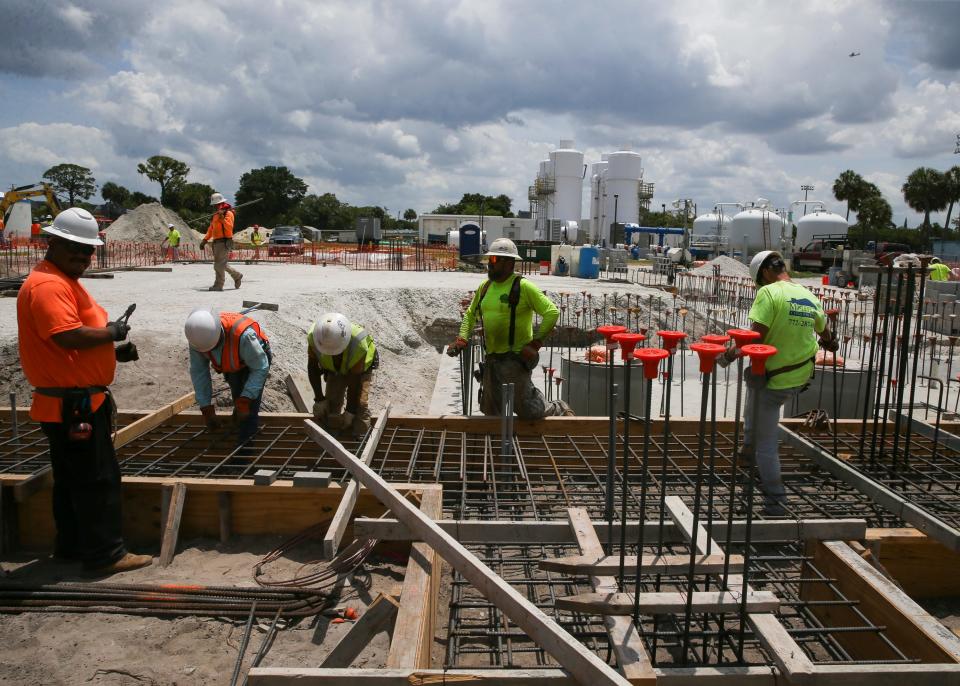Stuart reverse osmosis plant delayed, now slated for spring
Editor's note: This article has been modified from its original version to correct an error.
STUART — An $18.3 million drinking water treatment plant — the city’s most expensive project in over 20 years — is behind schedule, city officials said.
Supply shortages caused a months-long delay for the plant, which initially was estimated to be built by Nov. 30 and operational by February, city spokesperson Misti Guertin said. A ribbon-cutting ceremony is now being planned for April or May, Guertin said.
The reverse osmosis water treatment plant was prioritized after the 2016 discovery of PFAS contaminants in the drinking water supply. The plant will provide drinking water from the Floridan aquifer, which doesn't contain synthetic “forever chemicals” technically knowns as perfluoroalkyl and polyfluoroalkyl substances, city officials said.
Stuart expects to receive over $100 million in a $10.3 billion nationwide lawsuit settlement against 3M, the manufacturer of the PFAS that contaminated Stuart's drinking water.
The money will help pay for new water-filtration equipment, some of which the city already has installed. The city's drinking water now has undetectable PFAS levels, city officials said.
PFAS found in Stuart’s drinking water

The Environmental Protection Agency detected high levels of PFAS in Stuart’s water supply in 2014 and 2015, the first years the EPA tested for them. The most common among 5,000 types were used in household products and firefighting foams.
Stuart temporarily closed the three contaminated wells near the water treatment plant on Southeast Palm Beach Road in 2016, when the EPA recognized the chemicals’ dangers. At the time, 24 wells pumped water from the surficial aquifer system about 100-300 feet underground to over 19,000 customers.
In 2019, the city reopened the wells after building an ionic exchange facility to treat water.
In December 2020, the city drilled a 1,620-foot-deep well to the deeper Floridan aquifer in preparation for the reverse osmosis plant, which will treat up to 1.5 million gallons a day.
The plant will pump groundwater from the Floridan aquifer through filters that will sift out sediment and contaminants such as bacteria and viruses. The water may be further disinfected and remineralized, then stored in a well and distributed.
PFAS regulation

The U.S. and Florida governments don’t regulate PFAS in drinking water. The EPA’s non-regulatory and non-enforceable health advisory says PFAS can be dangerous over 70 parts per trillion, which it lowered by 65% from 200 parts per trillion in 2016.
Stuart’s highest level was 180 parts per trillion in 2014 and it averaged 43 in May 2017, city data shows. Officials attributed the 76% decrease to replacing the three contaminated wells.
On Dec. 11, 2023, the city measured about 14 parts per trillion of PFAS pre-treatment, five times lower than the EPA health advisory, and none post-treatment at the City of Stuart Water Treatment Facility.
Though not manufactured in the U.S. anymore, PFAS remain widespread in soil and water because they don’t break down.
Human health effects from exposure to low levels are uncertain, according to the U.S. Centers for Disease Control and Prevention. Studies on animals exposed to high levels found health problems such as cancer and liver and immune-system damage.
Stuart joined hundreds of communities in suing 3M but said it cannot comment on the pending litigation.
Katie Delk is an environmental reporter for TCPalm. Contact her at katie.delk@tcpalm.com or 772-408-5301. Check for updates at @katie_delk.
This article originally appeared on Treasure Coast Newspapers: PFAS update: Stuart reverse osmosis treatment plant to open in spring

